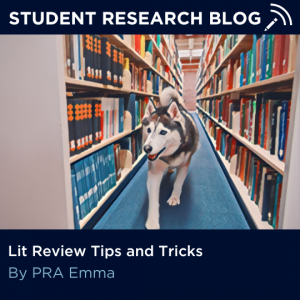By Emma Beard, Peer Research Ambassador
 As a STEM major, my biggest misconception about research was that I would spend more time at the lab bench than at my desk. I was surprised to find that for the first week of my time with the Health Research Program, I ran one or two experiments and then spent the rest of my time reading papers. At first, I felt like I wasn’t doing enough work since I wasn’t getting any data, but as I began to design my own experiments and brainstorm project directions, I realized just how important it is to learn from others’ projects. Reading research articles has been a constant throughout my time involved in undergraduate research, and through experience, I’ve discovered a few tricks that I would have loved to know when I was just getting started. While these tips are based on my experience in STEM research, hopefully one or two of these tips can help you as you begin your research journey, no matter the field!
As a STEM major, my biggest misconception about research was that I would spend more time at the lab bench than at my desk. I was surprised to find that for the first week of my time with the Health Research Program, I ran one or two experiments and then spent the rest of my time reading papers. At first, I felt like I wasn’t doing enough work since I wasn’t getting any data, but as I began to design my own experiments and brainstorm project directions, I realized just how important it is to learn from others’ projects. Reading research articles has been a constant throughout my time involved in undergraduate research, and through experience, I’ve discovered a few tricks that I would have loved to know when I was just getting started. While these tips are based on my experience in STEM research, hopefully one or two of these tips can help you as you begin your research journey, no matter the field!
1) Write down every paper you read
I don’t know how many times I’ve thought to myself, “oh I read this in a paper,” and then realized I couldn’t remember which paper I found it in. Especially when I was first getting started, I read a lot of research papers to get introduced to the field, but thought about them in almost the same way as a textbook for a course where once I learned the material, I could move on. I didn’t realize how much I would need to refer back to papers later on, especially the materials and methods section for guidance on how to plan my own experiments.
Whether it’s a hand-written list kept in your lab notebook or typed out on your computer, write down the title and a few key points or relevant experimental techniques from each paper you read. I’m usually someone who prefers to handwrite rather than type (and did when I first started making my list), but for ease of reference, I’d recommend a typed list. Control/Command+F will be your best friend once you’ve read enough articles, and having the direct links available is extremely helpful.
2) Mastering the “skim”
While all research is really cool, sometimes, it’s just not relevant enough to your work to do a deep dive. Having a quick way to get a sense of a paper’s topic before committing to a full read is helpful to maintain balance between the literature search aspect of research and your other research responsibilities. I can’t really take credit for this tip, since there are all sorts of columns and blog posts about how to properly read a paper (There are even some papers on reading papers!). But I’ll let you know what works best for me.
I almost always go from abstract to figures to discussion. I think many people recommend going from abstract to discussion to results, but I find that I never quite understand the discussion without a little bit of background from the results. To me, each figure and figure legend is like an abstract for a certain section of the results. They’re more concise than the actual text and give you an idea of what the authors were most interested in highlighting. Of course, the best way to read a paper varies depending on the person and their goal, but if you’re struggling to quickly sort papers, maybe give this a try!
3) Present relevant papers
Once you’ve figured out which papers you think require a thorough read, I recommend finding a way to present one of them. It’s not always fun, but the best way to learn really is to teach others. If your lab or department has a journal club or if you can present at lab meetings, take the opportunity to present a paper you found interesting. Not only will you have the opportunity to better understand the paper by talking about it to others, you might end up helping someone in the audience learn something new that they could use for their own project! The papers I remember best are the ones I’ve presented at lab meetings.
Reading research papers can be daunting, especially when first getting involved, but hopefully some of these tips will help you make the most of the literature search aspect of your research!
Emma is a senior majoring in Molecular and Cell Biology and minoring in Physiology and Neurobiology. Click here to learn more about Emma.